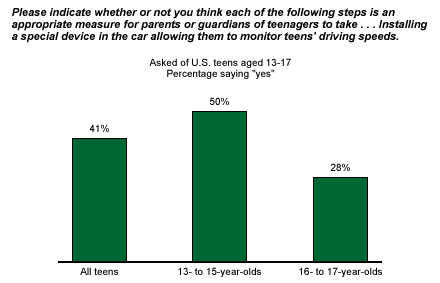Though it may seem like nagging to teen drivers, their parents' constant reminders to buckle up and slow down aren't meant to take the joy out of the joyride -- parents just want to ensure their teens are handling their newfound freedom safely and responsibly. They have reason to be cautious; car crashes are the leading cause of death for teenagers in the United States.
But a driver's license is like a declaration of independence for many teens, which is probably why a majority of them disapprove of the idea of having their parents install a device that monitors their driving speed. According to a recent ║┌┴¤═° Youth Survey*, 41% of teens said it would be appropriate for parents to install such a device, but most (59%) disagree. Support drops dramatically -- to 28% -- among teens who are old enough to drive.

Joel, a 16-year-old survey respondent from Washington who recently got his own keys to freedom, says devices like this may be good for some teens, but not necessarily all. "If the teen had previous behaviors of reckless driving or something, I think it would be OK for parents to do that," he says. "But if someone didn't have a case of a driving problem, it wouldn't be necessary to put a monitor on their car." All the same, Joel says he would feel "violated" if his parents installed a device in his car and sees it as a trust issue.
Alex Koroknay-Palicz, the executive director of the National Youth Rights Association, says his organization views these devices as an invasion of privacy. "It's a trust issue, a privacy issue, and it's also a discrimination issue," he says. "All of us have an interest in safe driving. It would not be appropriate for a husband to install one of these in his wife's car, yet parents can get away with it with their kids. It's a double standard and very much a problem."
The monitoring device that Larry Selditz, president and CEO of Road Safety International, Inc., manufactures isn't meant to be invasive or to spy, he says, but to help teens stay focused and drive safely. His company's "black box" monitors teens' driving behaviors, provides in-vehicle feedback to teens if they start driving unsafely, and records data for parents. Selditz says the response to his product has been overwhelming, and his company has sold several thousand.
"It's not about catching them doing something bad, it's about trying to prevent the bad thing in the first place," Selditz says. "If you drive unsafely every day and a parent sees that data, they're going to try and correct that behavior."
Teen contempt for these devices isn't unusual; Selditz says even his son didn't like having a "black box" installed in his car, but it's a condition of driving for him. "Driving ÔÇŽ for all of us, teenagers and adults, is a privilege. It's not a right, it's not guaranteed by the Constitution," Selditz says. "In my son's case, as a parent of a teenager, I made the decision that I want him to enjoy that privilege so long as he abides by some safe and responsible rules."
Koroknay-Palicz might disagree. "Teens are entitled to the same trust and respect as anyone else in the family," he says. "This sends the wrong message and does damage to them."
*These results are based on mail and Web surveys with a randomly selected national sample of 549 teenagers in the ║┌┴¤═° Poll Panel of households, aged 13 to 17, conducted April 15 to May 22, 2005. For results based on this sample, one can say with 95% confidence that the maximum error attributable to sampling and other random effects is ┬▒5 percentage points. In addition to sampling error, question wording and practical difficulties in conducting surveys can introduce error or bias into the findings of public opinion polls.